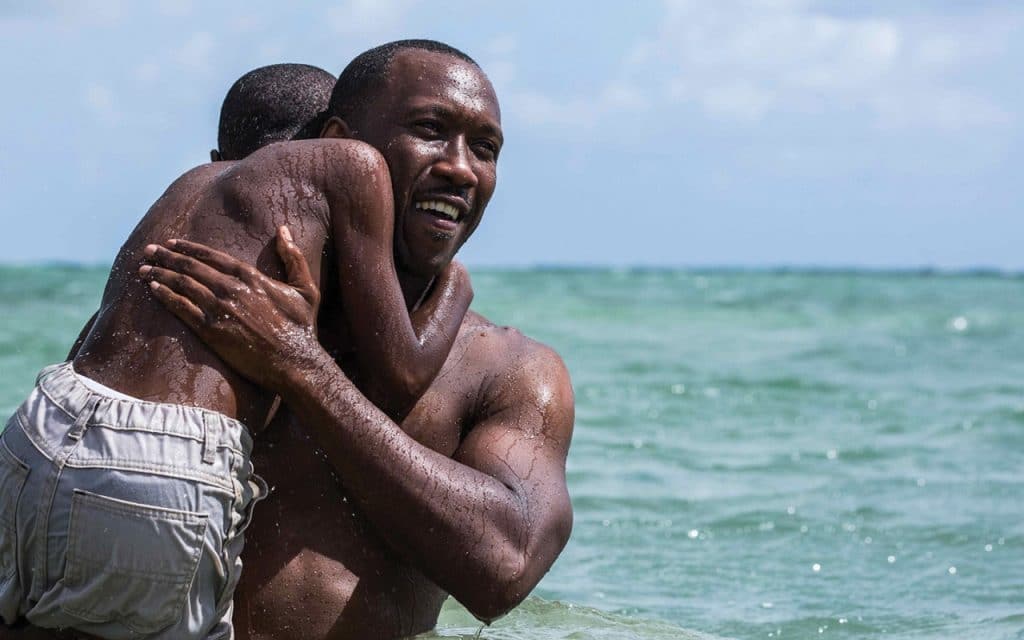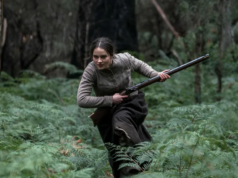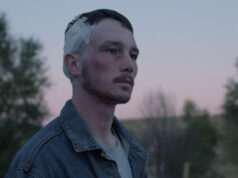More impressive and important than the beautiful story that Moonlight wants to tell is the elegant and delicate way it does it
Moonlight (2016)
Directed by Barry Jenkins. Screenplay by Barry Jenkins. Story by Tarell Alvin McCraney. Based on “In Moonlight Black Boys Look Blue,” by Tarell Alvin McCraney. Starring Trevante Rhodes, Ashton Sanders, Alex R. Hibbert, André Holland, Jharrel Jerome, Jaden Piner, Naomie Harris, Mahershala Ali, Janelle Monáe and Patrick Decile.
Barry Jenkins is a director who deeply understands the language of cinema. After watching his beautiful film Moonlight a second time in less than three days, I must admit I was left even more impressed. In only his second feature film, Jenkins surprises us with the sensitive and refined way he has chosen to tell a relatively simple story, bathing his narrative in gorgeous tones of blue that mainly serve to reflect the protagonist’s feelings and the sad universe he inhabits. The result he achieves is a work of immense poetic beauty and another proof of the visual power of narrative. As the late, great critic Roger Ebert used to say, it doesn’t matter so much what story you want to tell but rather how you tell it.
Based on the semi-autobiographical play In Moonlight Black Boys Look Blue by Tarell Alvin McCraney, the film (made with a budget of only $1.5 million) is divided into three chapters (or acts) that set out to chronicle the bleak life of African-American Chiron as he grows up in the crime-ridden neighborhood of Liberty City in Miami, deals with his crack-addicted mother and falls prey to constant bullying while discovering his own homosexuality. The story reflects the childhood of both Jenkins and McCraney, who grew up in the public housing complex of Liberty Square in the same neighborhood and also had mothers who were drug addicts.
Played by three actors in different moments of his life, Chiron is depicted as a shy boy with sad eyes who grows into a hardened man that could have had more in life. In the first chapter, the young Chiron known as Little (Alex R. Hibbert) is a skinny and quiet boy who embodies the vulnerability of being a child growing up in a dysfunctional home with an emotionally abusive mother. He has no friends, and his only companion is Kevin (Jaden Piner). In one scene that speaks a lot visually, we see a bunch of young kids (dressed in different shades of blue) playing with a rag ball while Chiron (wearing a red T‑shirt) tries to fit in but is kept aside and excluded.
Even so, it is touching to see that there are people willing to give him love, like the crack dealer Juan (Mahershala Ali) and his girlfriend Teresa (Janelle Monáe). “In moonlight, black boys look blue,” Juan recalls what an old lady once said to him. “At some point, you gotta decide for yourself who you’re going to be.” Juan may teach Chiron how to swim, but no one can swim for him. In a rough neighborhood like this, people do whatever they can to survive, and it is really tragic that the closest person to Chiron (Juan) is indirectly responsible for his depressing childhood, since Chiron’s mother Paula (Naomie Harris) buys drugs from him.
We see the sale of drugs on the streets, and a police car siren can be heard at a close distance. Being a meek young boy in such a place can be really hard. When he reaches adolescence, Chiron (now played by Ashton Sanders, exceptional) looks even skinnier and more fragile, as if he is about to break at any moment. His eyes carry the sadness of the world, and the other boys pick on him, clearly because they notice he is gay. Being gay in this place is also hard. “I cry so much, sometimes I feel like Imma just turn into drops,” he admits, in one the most painful scenes. Like all mothers, Paula knows that he is gay and going to suffer for who he is.
Naomie Harris, by the way, does an amazing job playing a complex character. Despite being a train wreck who abuses her own son emotionally and takes his money to buy more drugs, Paula shows a protective side and cares that he goes to school, so he won’t become someone like her. When we see her in the film’s third chapter, she looks older and nearly disfigured, the effects of years of drug addiction reflected on her decayed teeth and exhausted eyes. It is a careful composition that makes us feel profoundly sorry for her, even as she realizes the irreparable harm that she has caused her own son — and notice how the front of her hair looks blue now.
What makes Moonlight so special is not just the fact that it tells a beautiful story that deserves to be told, but the way it does so is elegant and sophisticated, with elaborate camera movements and an organic use of the color blue in almost every scene to mirror the character’s feelings (both in the cinematography and art direction). There is a delicate kiss scene on a beach, for instance, that is tinted in blue under the moonlight and looks gorgeous, like pure visual poetry. Likewise, the editing is stupendous and translates Chiron’s emotional stress in scenes that use a nervous camera and abrupt cuts — which also interrupt certain moments of tenderness that feel almost intrusive in a sad story like this.
At a certain moment, Kevin (played in the second chapter by Jharrel Jerome) suggests that Chiron “roll out into the water just like all these rambo-fuckers trying to drown their sorrow.” It seems like an alternative out of this ugly life. But some people learn to be tough, especially if you are black and do time. The Chiron we see in the third chapter (played by Trevante Rhodes and going by the name “Black”) is a natural consequence of so many hardening factors. His appearance is striking, yet we can still see something of the old Chiron in his eyes. Though it is hard to believe what this full-fledged man reveals about his lack of human contact, we buy it. And I love how he removes his gold teeth when he realizes his new “mask” is not necessary.
With a beautiful, melancholy music score by Nicholas Britell that combines classic orchestra (especially the sounds of piano and violins) and the “chopped and screwed” technique of hip-hop remixes, Moonlight also offers a modern discussion that would have never existed, say, 20 years ago between Juan and Chiron about being homosexual. The way the film deals with this subject is as mature as it is subtle and delicate, like the lyrics of a song that plays close to the end and says more than a thousand dialogue lines could.
Surprising us until the very last shot, which echoes the ending of François Truffaut’s The 400 Blows (1959), this film deserves all the awards it has been receiving. And I guess it will be hard for me not to think for a mighty long time how in Moonlight, black boys look blue.





